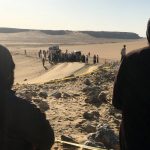By Coptic Solidarity –
On May 2018, the State Department issued its annual report on International Religious Freedom, which documents the state of religious freedom in 200 countries and territories worldwide except for the United States. Coptic Solidarity commends the many individuals who contribute to the creation of this report which continues to be one of the best available tools for those advocating religious freedom worldwide.
The Egypt chapter followed the traditional reporting format with an executive summary, religious demography, status of government respect for religious freedom, status of societal respect for religious freedom, and concluding with U.S. government policy. Similar to the 2016 report, Coptic Solidarity finds the 2017 report to lean more on the descriptive side and shy away from making definitive conclusions. The lack of definitive statements is likely intentional to allow for the most freedom in diplomatic discussion and negotiation. The downside of this is that one must be well-versed in international religious freedom and the specific country to have an accurate perspective of the state of religious freedom in the given country.
Below we outline the many positives of the report, a couple areas of disagreement, and recommendations for improvement.
Positives
- More reported activity of the US government promoting religious freedom in Egypt through the year including hosting a digital conference with Knox Thames for a discussion on religious freedom in Egypt, promoting religious freedom on social media throughout the year, diplomatic meetings and efforts to ensure greater accountability for perpetrators of attacks against religious minorities, and to track cases of violations of religious freedom.
- Utilized many excellent examples which illuminate the difficulties Copts currently experience repairing and building churches, applying for new permits, and the lack of response to submitted permits. This report makes amply clear that regularization of existing churches as well as church construction and renovation issues are far from resolved, recounting many scenarios in which churches have been closed due to violence from local Islamists who attack churches, Coptic homes, and individuals. In most cases, these churches have applied for licenses and not received them. According to the new Church law, they should continue to be functioning, but many have been closed both temporarily and some remain closed to the date of the report, which states that 60 churches remained closed by year’s end. The report contains multiple examples of accounts from Egyptian police and government officials that are inconsistent with what is reported by church authorities and parishioners. Egyptian authorities often claim they must close churches due to security threats from Islamists, even when this is not the case. What becomes clear is that the argument to close churches due to illegal protests and violent behavior by Islamists has been used as a “valid” reason to prevent Copts from exercising their rights to worship freely. The report also points out that the Egyptian government has set a double standard in the regulations on building churches such as “number and need” that are not required for building mosques.
- Inclusion of the case of Josef Reda Helmy, a Copt in the military who was tortured to death by other soldiers. Given the rise in the number of young Coptic soldiers murdered in their Army units, CS urges continued focus on this type of crime.
- Inclusion of many examples of impunity for those who attack religious minorities. Updates were given on a number of cases, including examples of charges being dropped against the perpetrators. Other key aspects of impunity that were highlighted include the use of so called “reconciliation” sessions in which police often arrest innocent Copts after suffering attacks by Muslims. Under the threat of prosecution of those Copts, families and communities often drop charges against their attackers to secure the release of the arrested Copts. In this way, Copts are often pressured to forgo their legal rights and efforts to seek justice.
- Inclusion of discrimination and incitement to hatred by Islamic religious leaders, media personalities and professors, in their own words. The use of these quotes provides illuminating evidence of discrimination and bigotry within Egypt towards religious minorities, particularly as they contain heinous ideas that the blood of non-Muslims is not equal to Muslims, hence the death penalty should not be enforced against any Muslim for murdering a Christian.
- Good description of the many legal obstacles and discrimination utilized against religious minorities in Egypt such as in the mandatory inclusion of faith on government issued ID cards, Sharia as primary source of legislation in Egypt and the application of Sharia to those who do not follow Islam, discrimination in custody rights with mixed faith marriages, and the inability of a Christian to marry a Muslim without converting to Islam while the reverse is not required.
Disagreement
- The presentation on kidnapping of Coptic women and underage girls includes several references to elopement, which CS finds misleading. The majority of these cases involve meticulously planned luring (along with support by the authorities) which amounts to de facto kidnapping, not elopement. The World Watch Monitor article cited in the report actually explains how girls are kidnapped against their will and pressured/forced to convert in situations in which they were led to believe their kidnapper would convert to Christianity. In the cases in which the girl originally wanted to elope, they are not given a chance to make their own decision when they later discover they have been misled, and are threatened by the use of force. So, the use of the term elopement is mostly misleading as it implies choice when that is rarely the case. The Egyptian government also regularly uses this claim of elopement to dismiss the many cases of kidnapping of Coptic women and girls. It also takes the focus away from the corrupt and complicit police officials who refuse to file reports or assist in finding missing Coptic women.
- The report mentions that the state-funded church in al-Our village in Minya was completed. Thirteen of the 20 Copts beheaded by ISIS in Libya originated from al-Our making it an ideal location for a church in honor of those martyrs. In reality, due to violence from Muslim villagers, the church was built outside the village in a refusal to allow those martyrs to be honored within their hometown. This seemingly small clarification is important in that it demonstrates the severe societal discrimination, which Copts endure daily and the lack of the government’s political will to afford them their constitutional rights to religious freedom.
Recommendations
- CS recommends adding a follow-up section to the report that would delineate more clearly major incidents and track what actions have been taken to prosecute perpetrators, and if any reparations have been made to the victims. The report mentioned many incidents and initial actions taken, which is good. Returning to these major cases with updates on administration of justice would provide a better understanding of the culture of impunity for those who attack religious minorities. CS recommends expanding this to include incidents such as the Maspero Massacre, the multiple church bombings, and the individual acts of violence against Copts and their property to bring greater continuity to the report and increase accountability.
- Report on the continued exclusion of Copts from all ‘prominent’ posts in government institutions, academia, military, judiciary, and state-owned media, which has deteriorated under Mr. al-Sisi. A few statistics were included in this report such as the admission of a single Copt into al-Azhar University, a government funded institution. CS published documentation on these very issues demonstrating the absence and serious underrepresentation of Copts in these institutions.
- Include list of known prisoners of conscience utilizing the cases reported by NGOs, religious communities, and by credible news sources. While this addition would place a greater burden on those tasked with creating the report, it would be an excellent tool and assist other governments, NGOS, and individuals with their advocacy efforts on behalf of those prisoners.
- CS recommends adding a section on policy priorities to further promote religious freedom in each country. The USCIRF report includes a policy section with excellent recommendations for the State Department to pursue in the following-year, based on their research and in-country visits. CS believes publishing these priorities would bring another level of accountability to the Egyptian government and assist in moving the line forward in specific, reasonable steps, to achieve greater equality for religious minorities.
- Except for a few steps meant for media consumption, the situation of the Copts and other minorities in Egypt has not changed from previous years if it has not gotten worse. CS recommends that Egypt be designated a ‘Country of Particular Concern,’ for engaging in “systematic, ongoing, and egregious” violations of religious freedom.
_________________________
Photo Credit: Relatives carried coffins and crucifixes during a mass funeral at a monastery in Alexandria. Reuters: Amr Abdallah Dalsh





